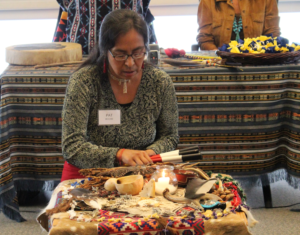Pachamama Hosts North American Indigenous Leaders
[post_thumbnail size="550"]
Last month, The Pachamama Alliance hosted a special delegation of Native American leaders, elders, and activists from across North America at our offices in San Francisco for a unique three-day gathering.
The Legacy of Colonization
Voices of the People, as the gathering was called, brought together Pachamama staff, board, and social justice allies to hear the original histories of colonization, displacement, genocide, boarding schools, and undermined treaties that have marked the experiences of indigenous peoples since the arrival of settlers from Europe in the 15th century.
Over the course of our time together, members of the Indigenous Environmental Network, chiefs from the Onondaga and Yankton Sioux, and world-acclaimed indigenous artists spoke candidly about relations between Native peoples and white governments. They also spoke of the various strategies for resistance and survival that have been employed to combat assimilation and eradication.
Putting a Face and History to Environmental Issues
The intention of the gathering was to develop an analysis of the particular issues facing indigenous peoples in North America, deepening The Pachamama Alliance's effectiveness as an organization committed to social justice.

For many participants, meeting with Native American leaders to talk about issues facing aboriginal Nations in the United States and Canada was a revelatory experience that put a face and history to environmental issues that many of us are working to redress.
Issues like the proposed Keystone XL pipeline, hydrofracking, uranium mining, illegal water extraction and nuclear waste sites all primarily affect Native communities. For them, social and environmental justice issues are fundamentally linked.
Establishing a Foundation for Social Justice
Confronting dominant narratives of colonization and occupied lands is a necessary first step to creating a viable coalition capable of undoing systems of oppression and bringing forth a world that works for all. Over the course of the three days, it became clear that history books have not gotten the story right.
While fully confronting 500 years of occupation and colonization cannot be completed in such a short time, Voices of the People was, in many ways, a good beginning.